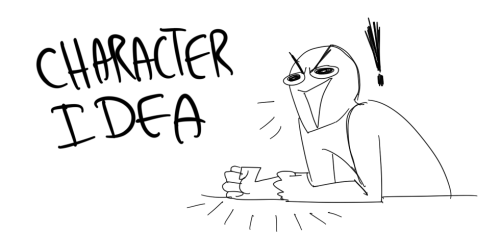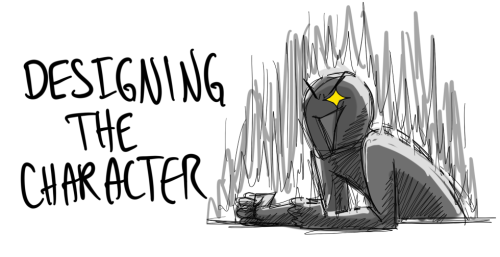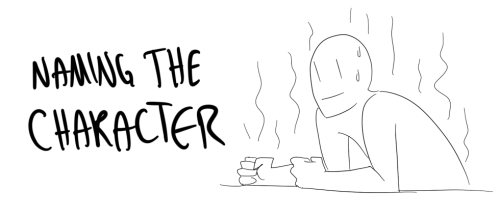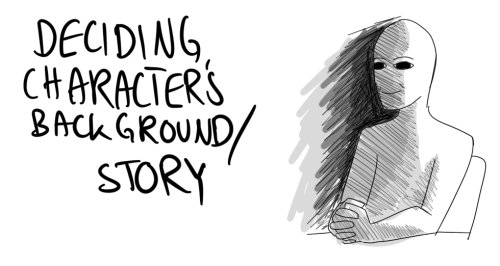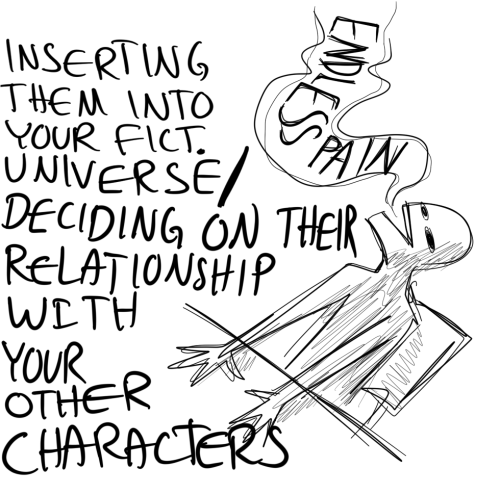When Inventing A Fantasy Religion A Lot Of People A) Make The Mistake Of Assuming That Everyone In Fantasy
When inventing a fantasy religion a lot of people a) make the mistake of assuming that everyone in fantasy world would worship the same gods and b) assume that polytheistic religions see all of their gods as morally good
More Posts from Sparklingsilvermagnolias and Others
Vibes for Softly Tortured Characters
For the ones who make you want to wrap them in a blanket and also scream “JUST TALK TO SOMEONE.”
Always looks like they didn’t sleep (because they didn’t)
Talks like they’re about to say something else, but never does
Constantly touches their sleeves/jewelry/lip, like if they’re not holding something, they’ll fall apart
Laughs too easily, but it never quite reaches their eyes
Over-apologizes for things no one noticed
Craves affection but flinches when they get it
Body language = trying to take up as little space as possible
Flashes of unexpected rage, like pressure finally cracking glass
Always says “I’m fine” in a tone that screams “Please ask again”
Cries alone, then wipes their face like it’s a secret
Feels safest in chaos because stillness feels like waiting for pain
Thinks being loved means being a burden
Cannot remember the last time they were truly, fully relaxed
Keeps people at arm’s length, but is the first to drop everything if someone else needs help
Treats their own joy like it's a luxury they didn’t earn
Battling Writer's Block
Believe it or not there are people out there who believe that writer's block isn't a thing. Nope, I'm not kidding, that is what my lecturer said last year and I just want to assure anyone that may believe it doesn't exist/ or are thinking of giving up on their work, don't. It is a very real thing and is very common to experience especially if you've written so much that you've managed to burn yourself out. Also, nobody in my class liked that lecturer for the rest of the year after making that comment so if you don't believe it's real...I wish you luck is all I'm gonna say lol.
So how do you prevent this?
Well first of all, you can't, but you can decrease how likely it is to happen.
Organisation
First thing is first, get your notes and your characters down somewhere you can look at them. Organisation will help a ton. Personally I have notes scattered all over the place both physical and on a folder on my laptop. Ideas come at random so I jot them down and then always forgot to put the physical notes somewhere. This meant I got stressed because I knew I had a good idea but couldn't remember exactly what it was. I did end up finding the notes and have now bought a folder to store my papers in. But this disorganisation meant I spent a lot of time overthinking my skills as a writer which then affected my confidence and ultimately resulted in writer's block.
Create
The next thing you can do is relax and create. Plots will come in time, focus on creating -- that's the fun bit especially if you're working in the fantasy or sci-fi genre! Don't create your plots first because as soon as you create your characters you might realise those plots won't work with those characters anymore. While this may not directly contribute to writer's block it definitely could affect your confidence so if you already have a good plot idea but find your characters don't fit then store away the idea for later to use with characters that will work for it.
Also I know I only focused on the writing aspect of creation but if you want to create other things then do that, too! Draw, make models, maybe a small mistake you make might give you inspiration!
Take a walk
This is common advice I see and that is taking a walk. If you can't find the inspiration to work on your current project but want to write something, grab your laptop or notebook and just wander around in a park and focus on your senses. What can you hear? What are the conversations people are having? What can you see? Try and show it instead of telling. Is there wind, can you feel it?
Create Your Own Definition For Your Favourite Words
If you don't want to write something too complicated and can feel your motivation disappearing but want to try and regain it, search for words and show your meanings for it instead of what the official definition is. For example the word 'love', the official definition is generalised and always straight to the point but the word means different things for different people. So what is love to you?
Poetry
Adding onto the previous paragraph, maybe try poetry! Last year I was dreading my poetry module but I have actually enjoyed it so far. I never thought I would but at 3am I find myself drafting up a poem to work on the next day. I do have old notes somewhere so when I find them I'll post them here so you have a sort of visual for how some poetry forms work. My favourite type of poetry is freeverse so if you're wanting to create a story without necessarily rhyming but keeping within the poetry theme, that would be a great way to start!
Relax
Finally, read. Sit down somewhere with a cup of hot chocolate or your favourite drink and read. Take some time for yourself, your writing isn't going anywhere and either way it takes time. Writing is a skill to develop not something to rush. Rushing will result in confusion and you may miss out some minor plot points you wanted to add. Reading helps you learn so pick out pieces that you enjoy from the book and see if you can incorporate it into your own work somehow.
To all my fellow writers out there, take a breath. Everything will come to you in time.
Writing with Colors

A list of resources to help you describe different colors in your writing.
The Color Thesaurus A collection of infographics that show various shades of different colors, each shade/color labeled by name.
Color Reference Chart Another collection of infographics that show various shades of different colors, each shade/color labeled by name.
Hair Color Reference Chart A collection of infographics that show various shades of different hair colors, each shade/color labeled by name.
Eye Color Reference Chart A collection of infographics that show various shades of blue, brown, and green eye colors, each shade/color labeled by name.
Different Ways to Describe Hazel Eyes A list of ideas and suggestions for describing hazel eyes. Can be used as prompts or for brainstorming.
Different Ways to Describe Green Eyes A list of ideas and suggestions for describing green eyes. Can be used as prompts or for brainstorming.
Different Ways to Describe Blue Eyes A list of ideas and suggestions for describing blue eyes. Can be used as prompts or for brainstorming.
Different Ways to Describe Brown Eyes A list of ideas and suggestions for describing brown eyes. Can be used as prompts or for brainstorming.
+
I’m a writer, poet, and editor. I share writing resources that I’ve collected over the years and found helpful for my own writing. If you like my blog, follow me for more resources! ♡
my 10 holy grail pieces of writing advice for beginners
from an indie author who's published 4 books and written 20+, as well as 400k in fanfiction (who is also a professional beta reader who encounters the same issues in my clients' books over and over)
show don't tell is every bit as important as they say it is, no matter how sick you are of hearing about it. "the floor shifted beneath her feet" hits harder than "she felt sick with shock."
no head hopping. if you want to change pov mid scene, put a scene break. you can change it multiple times in the same scene! just put a break so your readers know you've changed pov.
if you have to infodump, do it through dialogue instead of exposition. your reader will feel like they're learning alongside the character, and it will flow naturally into your story.
never open your book with an exposition dump. instead, your opening scene should drop into the heart of the action with little to no context. raise questions to the reader and sprinkle in the answers bit by bit. let your reader discover the context slowly instead of holding their hand from the start. trust your reader; donn't overexplain the details. this is how you create a perfect hook.
every chapter should end on a cliffhanger. doesn't have to be major, can be as simple as ending a chapter mid conversation and picking it up immediately on the next one. tease your reader and make them need to turn the page.
every scene should subvert the character's expectations, as big as a plot twist or as small as a conversation having a surprising outcome. scenes that meet the character's expectations, such as a boring supply run, should be summarized.
arrive late and leave early to every scene. if you're character's at a party, open with them mid conversation instead of describing how they got dressed, left their house, arrived at the party, (because those things don't subvert their expectations). and when you're done with the reason for the scene is there, i.e. an important conversation, end it. once you've shown what you needed to show, get out, instead of describing your character commuting home (because it doesn't subvert expectations!)
epithets are the devil. "the blond man smiled--" you've lost me. use their name. use it often. don't be afraid of it. the reader won't get tired of it. it will serve you far better than epithets, especially if you have two people of the same pronouns interacting.
your character should always be working towards a goal, internal or external (i.e learning to love themself/killing the villain.) try to establish that goal as soon as possible in the reader's mind. the goal can change, the goal can evolve. as long as the reader knows the character isn't floating aimlessly through the world around them with no agency and no desire. that gets boring fast.
plan scenes that you know you'll have fun writing, instead of scenes that might seem cool in your head but you know you'll loathe every second of. besides the fact that your top priority in writing should be writing for only yourself and having fun, if you're just dragging through a scene you really hate, the scene will suffer for it, and readers can tell. the scenes i get the most praise on are always the scenes i had the most fun writing. an ideal outline shouldn't have parts that make you groan to look at. you'll thank yourself later.
happy writing :)
bingewatching will never come close to bingereading. there is nothing like blocking out the entire Earth for ten hours to read a book in one sitting no food no water no shower no bra and emerging at the end with no idea what time it is or where you are, a dried-up prune that's sensitive to light and loud noises because you've been in your room in the dark reading by the glow of a single LED. it's like coming back after a three-month vacation in another dimension and now you have to go downstairs and make dinner. absolutely transcendental
Soooo maybe an oddly specific question. Could you recommend your favorite books about politics in the last decade? Or even in the last 20 years? My school sucked and I'm trying to learn about modern politics on my own but there's so much content available that I'm lost. And you're very smart and read a lot, so I'm hoping you have recommendations. Thanks!!!
Omg thank you, I do read a lot so I’m glad someone appreciates it.
Here are my top 20 books on politics and related sociological issues. I included some of these in a list I made over Christmas but I'll add to it here, and most are from the last 20 years.
This Town: Two Parties and a Funeral — plus plenty of valet parking! — in America’s Gilded Capital by Mark Leibovich
They Were Her Property: White Women as Slave Owners in the American South by Stephanie E. Jones-Rogers
The Destruction of Hillary Clinton by Susan Bordo (pair with What Happened by Hillary Rodham Clinton)
All the President's Men by Carl Bernstein
We Were Eight Years in Power: An American Tragedy by Ta-Nehisi Coates
Caste: The Origins of Our Discontents by Isabel Wilkerson
The Cruelty is the Point by Adam Serwer
Why We're Polarized by Ezra Klein
Women & Power: A Manifesto by Mary Beard
The Soul of America: The Battle for our Better Angels by Jon Meacham
This Will Not Pass: Trump, Biden, and the Battle for America's Future by Jonathan Martin and Alexander Burns
Political Fictions by Joan Didion
A Promised Land by Barack Obama
The Origins of Totalitarianism by Hannah Arendt
Team of Rivals: The Political Genius of Abraham Lincoln by Doris Kearns Goodwin
The Optimistic Leftist: Why the 21st Century Will Be Better Than You Think by Ruy Teixeira
The Perils of “Privilege” by Phoebe Maltz Bovy
Both/And by Huma Abedin
Renegades by Barack Obama and Bruce Springsteen (usual recommendation to listen to their podcast)
Beautiful Things by Hunter Biden (As you can tell by the below excerpt, Hunter Biden is me fr fr)

Repressed Emotion Scene Prompts
»» Saying “I’m fine” while their hands shake.
»» Laughing a little too loudly at something not funny.
»» Keeping their posture perfect while their jaw clenches.
»» Dodging emotional questions with charm or sarcasm.
»» “It’s not a big deal,” said like a prayer and a lie.
»» Crying alone in a bathroom stall.
»» Changing the subject every time it gets personal.
»» Numb silence after something devastating.
»» Scrubbing their hands like they can wash away a feeling.
»» Suddenly cleaning or organizing something—anything.
»» Avoiding mirrors.
»» Letting anger slip in where sadness lives.
»» Staring into space with their mouth slightly open, lost in it.
»» A tight smile that doesn’t even reach their cheeks.
»» Hugging someone stiffly—like they don’t know how anymore.
»» Not reacting when they should.
»» Punching a wall.
»» Pressing fingers to their temple like they're trying to hold their head together.
»» Keeping a secret so deep they forgot it was there.
»» “No, really. I’m good.” Said like a lie they need to believe.

also a poem from the new, unreleased collection. very possibly my own all-time favourite.
-
 goodbyegoodsprings liked this · 1 month ago
goodbyegoodsprings liked this · 1 month ago -
 allisonkittel liked this · 1 month ago
allisonkittel liked this · 1 month ago -
 celestiachan reblogged this · 1 month ago
celestiachan reblogged this · 1 month ago -
 celestiachan liked this · 1 month ago
celestiachan liked this · 1 month ago -
 product-of-boredom reblogged this · 1 month ago
product-of-boredom reblogged this · 1 month ago -
 product-of-boredom liked this · 1 month ago
product-of-boredom liked this · 1 month ago -
 sparklingsilvermagnolias reblogged this · 1 month ago
sparklingsilvermagnolias reblogged this · 1 month ago -
 hodgepodge-miscellany reblogged this · 1 month ago
hodgepodge-miscellany reblogged this · 1 month ago -
 everyscreentoobeseen reblogged this · 1 month ago
everyscreentoobeseen reblogged this · 1 month ago -
 everyscreentoobeseen liked this · 1 month ago
everyscreentoobeseen liked this · 1 month ago -
 pieroguetrader liked this · 1 month ago
pieroguetrader liked this · 1 month ago -
 janusfranc15 reblogged this · 1 month ago
janusfranc15 reblogged this · 1 month ago -
 canontypicalgoblins liked this · 1 month ago
canontypicalgoblins liked this · 1 month ago -
 a-boros-named-seamus reblogged this · 1 month ago
a-boros-named-seamus reblogged this · 1 month ago -
 a-boros-named-seamus liked this · 1 month ago
a-boros-named-seamus liked this · 1 month ago -
 ineverychronicle reblogged this · 1 month ago
ineverychronicle reblogged this · 1 month ago -
 myheartismadeofstars liked this · 1 month ago
myheartismadeofstars liked this · 1 month ago -
 poquemonsplices liked this · 1 month ago
poquemonsplices liked this · 1 month ago -
 stormspecter reblogged this · 1 month ago
stormspecter reblogged this · 1 month ago -
 breathing-chaos reblogged this · 1 month ago
breathing-chaos reblogged this · 1 month ago -
 kirbysreturntodreamlanddx reblogged this · 2 months ago
kirbysreturntodreamlanddx reblogged this · 2 months ago -
 mandydoesstuff liked this · 2 months ago
mandydoesstuff liked this · 2 months ago -
 lowerearthorbit reblogged this · 2 months ago
lowerearthorbit reblogged this · 2 months ago -
 berosar reblogged this · 2 months ago
berosar reblogged this · 2 months ago -
 wendydellapioggia reblogged this · 2 months ago
wendydellapioggia reblogged this · 2 months ago -
 archive-of-sorts reblogged this · 2 months ago
archive-of-sorts reblogged this · 2 months ago -
 an-indecisive-nerd liked this · 2 months ago
an-indecisive-nerd liked this · 2 months ago -
 raaafl reblogged this · 2 months ago
raaafl reblogged this · 2 months ago -
 orangetoffee reblogged this · 2 months ago
orangetoffee reblogged this · 2 months ago -
 fluffyllamacorn reblogged this · 2 months ago
fluffyllamacorn reblogged this · 2 months ago -
 beetlebugz liked this · 2 months ago
beetlebugz liked this · 2 months ago -
 judiops reblogged this · 2 months ago
judiops reblogged this · 2 months ago -
 vergi1ius reblogged this · 2 months ago
vergi1ius reblogged this · 2 months ago -
 vergi1ius liked this · 2 months ago
vergi1ius liked this · 2 months ago -
 talesofcatlantis reblogged this · 2 months ago
talesofcatlantis reblogged this · 2 months ago -
 talesofcatlantis liked this · 2 months ago
talesofcatlantis liked this · 2 months ago -
 idfk-what-im-doing liked this · 2 months ago
idfk-what-im-doing liked this · 2 months ago -
 crim-bat reblogged this · 2 months ago
crim-bat reblogged this · 2 months ago -
 ephemeraltea reblogged this · 2 months ago
ephemeraltea reblogged this · 2 months ago -
 mouses-references reblogged this · 2 months ago
mouses-references reblogged this · 2 months ago -
 papi-serpiente reblogged this · 2 months ago
papi-serpiente reblogged this · 2 months ago -
 papi-serpiente liked this · 2 months ago
papi-serpiente liked this · 2 months ago -
 wrenmuir reblogged this · 2 months ago
wrenmuir reblogged this · 2 months ago -
 i-eat-bookss reblogged this · 2 months ago
i-eat-bookss reblogged this · 2 months ago -
 i-eat-bookss liked this · 2 months ago
i-eat-bookss liked this · 2 months ago -
 dylchillvill liked this · 2 months ago
dylchillvill liked this · 2 months ago -
 littlemeangreen reblogged this · 2 months ago
littlemeangreen reblogged this · 2 months ago -
 peanutbutter-and-jellie liked this · 2 months ago
peanutbutter-and-jellie liked this · 2 months ago -
 bronzewyrm reblogged this · 2 months ago
bronzewyrm reblogged this · 2 months ago -
 bronzewyrm liked this · 2 months ago
bronzewyrm liked this · 2 months ago

119 posts









